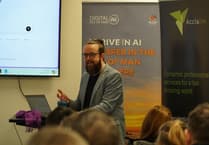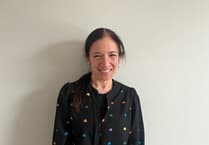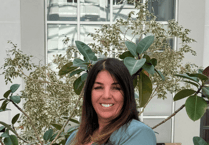A former student, who went on to become one of Britain’s greatest innovators, was welcomed back to school as the guest of honour at King William’s College Founders’ Day.
Dr John Taylor, one of the most distinguished OKWs (the title given to one-time pupils, staff or governors), fondly recalled his days at the private school and told the assembled audience how his initial struggles with dyslexia were overcome and provided the foundation for the rest of his life.
That college education ultimately set him on the path of becoming an entrepreneur/inventor who was honoured in 2012 for his contribution to the advancement of British engineering, innovation and commerce.
Dr Taylor spoke of the importance of a ’world-class education’ and the grounding KWC life gave him.
The inventor and horologist said: ’When I was 11, my parents were told I was practically illiterate and couldn’t even spell the name of my own school. But I did a good maths paper and a good science paper and staff here said "I think we can make something of him".’
Although he started as a boarder in Dickson House in September 1950, guests heard how he was summoned to the principal at the end of that academic year as he was ’bottom of the form’ in many subjects.
’The principal was sat behind his desk in full mortarboard and gown with a frown, so his eyebrows met as I stood before him. "Taylor, you are either lazy or thick - or both, you must work harder".
’I was neither lazy nor thick. I was and of course still am, dyslexic, but in those days, dyslexia was unknown and unrecognised.
’For those who are not familiar with dyslexia, for me it means that I see words as a shape rather than a phonetic system of sounds and it requires you to think ahead and round a problem.
’Yet three years after joining King William’s College, I passed the first exams I had ever taken with 12 O-levels.
’In the sixth form, I won the Beatson Science prize for physics twice and passed my A-levels. I stayed on for a third year in the Sixth Form and took the Cambridge entrance exam for Corpus Christi College.’
Offering his best wishes to the departing International Baccalaureate students, Dr Taylor urged them to ’find a passion and follow it’.
He added: ’When I was awarded an OBE for services to business and horology, I thought to myself, that’s not too shabby for a practically illiterate person! So, I hope that you can see from my story that there are no givens in life. You can’t change the cards life has dealt you but you can change the way you play those cards and a world class education is a great way to start. Find a passion and follow it.’
educated
Educated at KWC and then at Corpus Christi College in the University of Cambridge where he read natural sciences, Dr Taylor moved to the Isle of Man in 1977.
He joined Strix and later became famous for inventing the thermostat for the electric kettle.
His 400 patents for domestic appliances and electrical equipment have created more than 10,000 British jobs, while two billion of his bi-metal blades for thermostats that switch off kettles have been produced worldwide. By the time he retired in 1999, Strix supplied 75 per cent of the world market for kettle controls and had won four Queen’s Awards.
To much amusement, Dr Taylor also reflected upon his time at Cambridge, including an expedition to the Arctic in the summer of 1958.
’One of the greatest experiences of my life will always be hearing a polar bear outside my tent - with the nearest rifle 30 miles away as the polar bear started demolishing the tent,’ he recalled.
As well as a vote of thanks from head of school, Natasha Ellis, and head boy Sabin Rufa, principal Joss Buchanan addressed the 850-strong audience and said it was fitting to recognise the achievements of an engineer and entrepreneur as the school celebrated the achievements of its pupils, particularly those in the Upper Sixth.
’Whether through his appearances on television or radio, Dr Taylor’s passion for inventing and designing new products has encouraged a whole new generation to follow in his footsteps,’ he said.
The principal extolled the virtues of the IB diploma, which the college offers instead of A-levels. Every pupil has to study a science in addition to maths and they have to study a second language as well as their own language.
complain
Mr Buchanan said: ’When employers complain about employability, they often mean that young people have undergone a narrow academic curriculum without a wider range of subjects and skills.
’The early specialisation that takes place in the UK is in contrast to what happens in most other countries. When it comes to the next stage of education and university, that lack of scientific skills affects a very broad range of fields. All of us today need to have some scientific literacy.’





Comments
This article has no comments yet. Be the first to leave a comment.